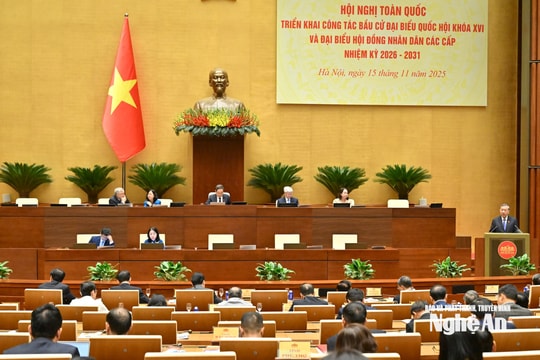Tax arrears are still high, many amounts are irrecoverable.
Total tax debt as of August 31 was VND 88,253 billion, an increase of 8.2% compared to December 31, 2018; of which tax debt that is no longer payable to the budget is VND 42,990 billion.
 |
| Minister of Finance Dinh Tien Dung presented the Proposal on the draft Resolution on tax debt relief, late payment penalty cancellation, and late payment interest for taxpayers who are no longer able to pay the state budget. (Photo: Phuong Hoa/VNA) |
Chairman of the National Assembly's Finance and Budget Committee Nguyen Duc Hai presented the Report on examining the draft Resolution on tax debt relief, late payment penalty cancellation, and late payment interest for taxpayers who are no longer able to pay the state budget.
Focus on processingtax arrears
According to the Government's Report, recently, tax authorities have made many efforts in collecting tax arrears, and tax debt management has achieved important results.
The ratio of total debt to total domestic revenue has decreased sharply from 12.2% in 2014, to 6.9% by the end of August 2019. However, the tax arrears situation is still high, the total tax arrears as of August 31, 2019 was VND 88,253 billion, an increase of 8.2% compared to December 31, 2018; of which the tax arrears that are no longer payable to the budget are VND 42,990 billion, accounting for 48.7% of the total tax arrears.
The Law on Tax Administration stipulates that the late payment penalty is 0.03%/day calculated on the amount of late tax payment, this provision is a necessary sanction. However, because taxpayers have died, gone missing, lost civil act capacity or businesses are undergoing dissolution or bankruptcy procedures or businesses, production and business establishments have actually ceased operations or had their business registration certificates revoked by competent authorities and are no longer able to pay taxes, the amount of late payment has increased over time. The total amount of late payment penalties and late payment fees that tax authorities have calculated and managed for the above subjects as of August 31, 2019 is 15,779 billion VND, but in reality there is no possibility of recovery.
Based on current legal regulations, tax authorities have actively handled tax arrears. The Ministry of Finance has issued a directive on handling arrears. Based on that, tax authorities have developed debt collection plans, reported to the People's Committees of provinces and cities for approval, and assigned responsibilities to units and individuals in debt collection. Thus, debt collection results in recent years have been quite good, reaching 80% of recoverable debts. However, some units have only focused on collecting recoverable debts, while outstanding debts have not been completely handled due to the lack of a mechanism for implementation.
Stating the necessity of issuing the Resolution, the Submission stated: Implementing the direction of the National Assembly Standing Committee in Document No. 2667/TB-TTKQH dated March 19, 2019, the Government has completed the amended Law on Tax Administration and submitted it to the National Assembly for promulgation of the Law on Tax Administration No. 38/2019/QH14. This Law fully stipulates the subjects eligible for debt settlement and the conditions for settlement, and the authority to settle debts. However, the Law on Tax Administration No. 38/2019/QH14 takes effect from July 1, 2020; therefore, debts arising before July 1, 2020 cannot be retrospectively settled.
The current Tax Administration Law stipulates 3 cases where tax debts can be cleared, but the conditions must be met: debt enforcement measures must be implemented sequentially and the tax debt must be 10 years old. Most of the current debts do not meet the 10-year condition, so they cannot be processed. Meanwhile, in cases where taxpayers have died, gone missing, businesses have dissolved, gone bankrupt, or stopped operating, and are in fact no longer able to pay the state budget, fines and late payment fees are still calculated.
In addition, the previous Tax Administration Law No. 78/2006/QH11 stipulated fines and late payment penalties, however, the legal regulations on administrative sanctions require the separation of two acts - administrative sanctions and late payment fees. The Tax Administration Law No. 21/2012/QH13, effective from July 1, 2013, has adjusted the act of late payment of tax subject to "late payment fine" into "late payment fees". Therefore, there is no mechanism for handling "late payment fees" under the Tax Administration Law No. 21/2012/QH13 to date.
Tax Administration Law No. 78/2006/QH11 also stipulates that in cases of force majeure, penalties for late payment of taxes, also known as "late payment fines", are exempted. However, Tax Administration Law No. 21/2012/QH13 does not have provisions for exemption of "late payment fees". Therefore, in cases of force majeure, late payment fees arising from some late payment fines and late payment fees that have not been processed...
It is necessary to issue a Resolution on tax debt relief.
Presenting the Report on the examination of the draft Resolution of the National Assembly on tax debt relief, late payment penalty cancellation, late payment fees for taxpayers who are no longer able to pay the state budget, Chairman of the National Assembly's Finance and Budget Committee Nguyen Duc Hai said that after studying the Government's Submission, the Finance and Budget Committee basically agreed on the necessity of issuing a Resolution like the Government's Submission and said that Article 65 of the current Law on Tax Administration stipulates 3 cases of tax debt cancellation.
The Government and the Ministry of Finance have provided guidance on timely and legal handling of tax arrears, late payment fees, and late payment penalties for taxpayers. However, the amount of irrecoverable debt that is cleared under the provisions of the current Tax Administration Law is very low (only 0.51% of the irrecoverable debt), while these tax debts are subject to late payment fees (0.03%/day), leading to an increase in the amount of irrecoverable debt over the years, creating pressure on the tax administration agency to handle the arrears, even though the state budget is no longer able to collect from these subjects.
In addition, the current Law on Tax Administration does not regulate debt cancellation, while the implementation of the provisions on debt cancellation for 3 groups of subjects in the current Law on Tax Administration still has many shortcomings and cannot be implemented such as: In the process of production and business, many enterprises lose their ability to pay, terminate business activities but do not complete bankruptcy procedures according to the provisions of the Law on Bankruptcy or only notify bankruptcy but do not complete bankruptcy procedures. Therefore, the tax administration agency does not have a record as a basis for considering debt cancellation according to the provisions of Clause 1, Article 65 of the current Law on Tax Administration.
In the case of debt cancellation for taxpayers who have died or are missing and have no assets to pay taxes, in reality, when an individual dies, it is not possible to confirm whether the taxpayer still has assets or not. If there are assets, are these assets still under the joint ownership of the husband or wife's family and children or not? The division of assets cannot be carried out according to the provisions of the law on inheritance, leading to a situation where it is not possible to determine whether the taxpayer still has assets or not to handle debt cancellation according to the provisions of Clause 2, Article 65 of the current Law on Tax Administration.
 |
| National Assembly delegate of Khanh Hoa province Do Ngoc Thinh speaks at the meeting. (Photo: Phuong Hoa/VNA) |
After these enforcement steps, almost all businesses go bankrupt, dissolve, lose the ability to do business, have no assets at the place of business registration, many taxpayers abandon their business addresses, die, go missing... Therefore, the tax authority cannot continue to implement the remaining enforcement measures according to the provisions of the current Law on Tax Administration.
Furthermore, for enterprises that cease operations for 1 year without notifying the business registration authority and tax authority, their business registration authority will also revoke their license. Therefore, the tax authority cannot process debt cancellation in accordance with the provisions of Clause 3, Article 65 of the current Law on Tax Administration.
The current Law on Tax Administration does not fully cover the subjects that need to have their debts frozen or erased in cases where they are no longer able to pay the state budget, leading to an increasing amount of uncollectible debts and the emergence of additional tax debtors, such as cases where taxpayers have abandoned their business addresses, had their business licenses revoked, cases of natural disasters, force majeure or tax debts that have not been paid by the State...
The Finance and Budget Committee agreed on the necessity of issuing a Resolution of the National Assembly to implement the tax debt freeze, late payment penalty cancellation, and late payment interest for taxpayers who are unable to pay the budget as requested by the Government.
The Finance and Budget Committee agreed to submit to the National Assembly for consideration and approval a Resolution on tax debt relief, late payment penalty cancellation, and late payment interest for taxpayers who are no longer able to pay the state budget in accordance with the procedures at a session as per the Government's Submission.
The dossier submitted for the Resolution project has fully included the contents of the Policy Impact Assessment Report, the Summary Assessment Report on tax debt management, implementation of tax debt cancellation regulations according to the Law on Tax Administration; receiving comments from the Ministry of Finance on the comments of ministries, branches, localities and appraisal comments from the Ministry of Justice... ensuring compliance with the Law on Promulgation of Legal Documents.
During the remaining time of the morning session, the National Assembly discussed in the hall a number of contents with different opinions of the draft Law on Securities (amended)./.









